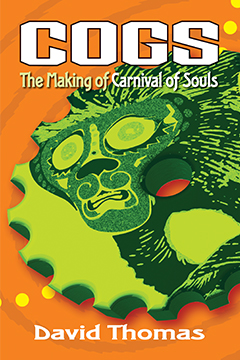
Cogs, The Making Of Carnival Of Souls
by David Thomas
Published by Ubu Projex/Hearpen.
Paperback, 100 pages
Release Notes
'Cogs' is the 100 page liner note publication accompanying the release of Pere Ubu's Carnival of Souls. David Thomas takes the reader behind the scenes of the album's conception, with insights into the unique internal workings of this extraordinary band.
"Pere Ubu is a machine. The cogs are aligned so that the engine emphasizes rather than homogenizes the unique contributions of each individual. Frayed nerves, ill-tempered turbulence and unpredictability, provocation and Mayhem, are wired into the apparatus."
"David likes to throw the Curve Ball of Discomfort!"Keith Molinè's diary, quoted in 'Cogs,' reveals his uncensored thoughts on the tour, the US visa episode and the album's incarnation.
With commentary from all of the Pere Ubu musicians, as well as soundman Nadan Rojnić, lyrics and, of course, a stream of footnotes, this is more than an accessory to the music. This is about what can be done when you ignore what may or may not be impossible and just get on with it.
"Hey, batter batter! Swing!" The book was designed by Kiersty Boon.
Cover design by John Thompson from artwork by Alexandre Horne.
Press Quotes
Greil Marcus, Double Trouble (Faber And Faber, 2000), pgs. 167-168.
Thomas' gnostic argument - that art exists to at once reveal secrets and to preserve them - makes sense of a particularly American - or modern - form of storytelling. In a big, multifaceted democracy, you're supposed to be able to communicate directly with everyone, yet many despair of being understood by anyone at all... Out of this comes an American language that means to tell a story no one can turn away from. But this language - identified by D. H. Lawrence in 1923, in Studies in Classic American Literature, as the true modernist voice, the voice of Hawthorne, Poe, Melville - is cryptic before it is anything else. It is all hints and warnings, and the warnings are disguised as non sequiturs. The secret is told, but nonetheless hidden, in the musings, babblings, or tall tales of people who seem too odd to be like you or me, like us - like the author who puts his or her name to the story, insisting that he made it all up, that she just did it for the money.